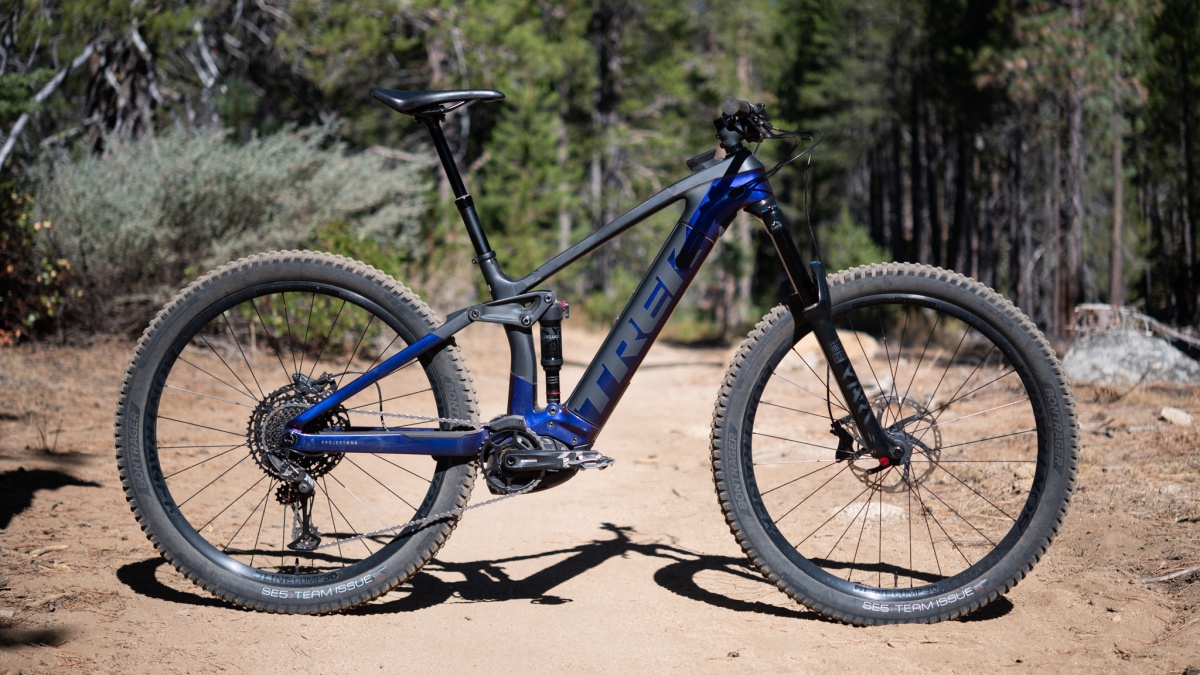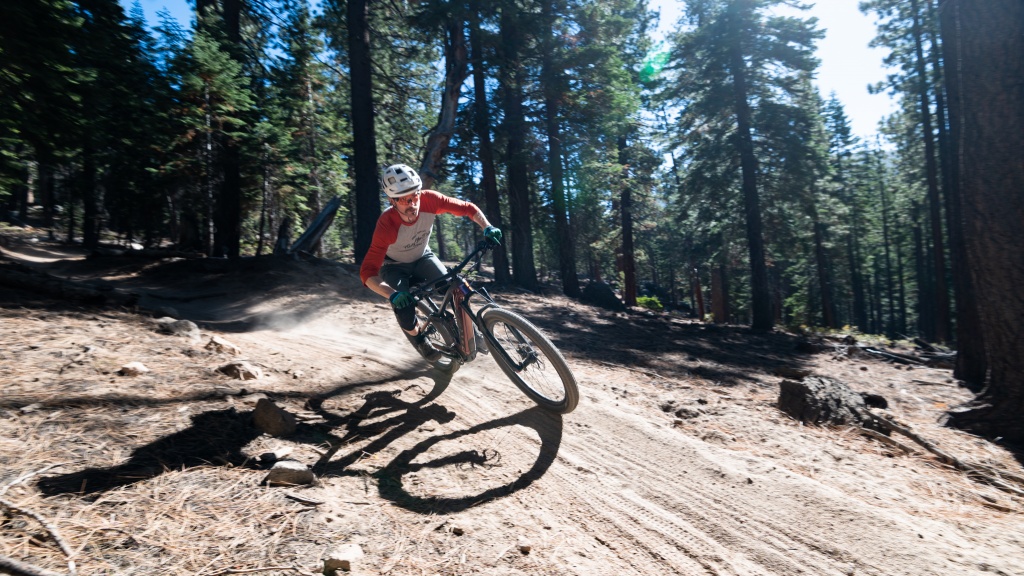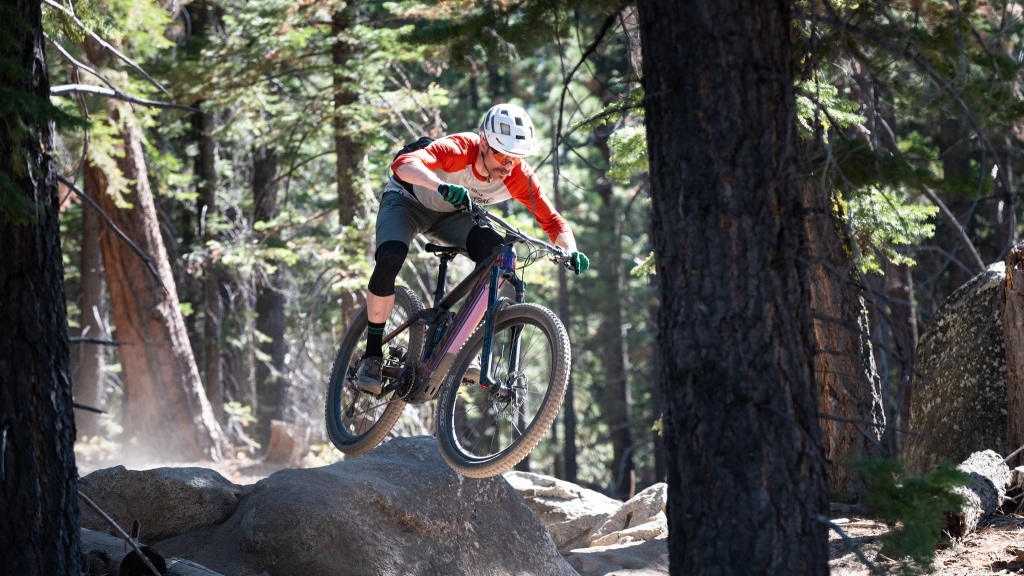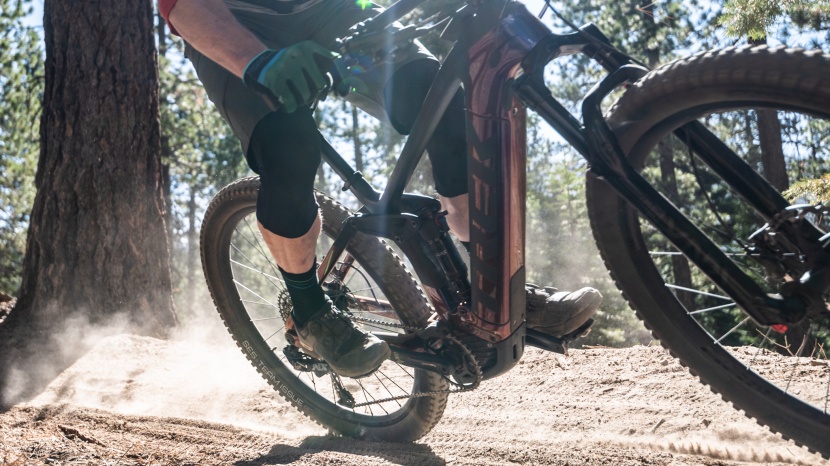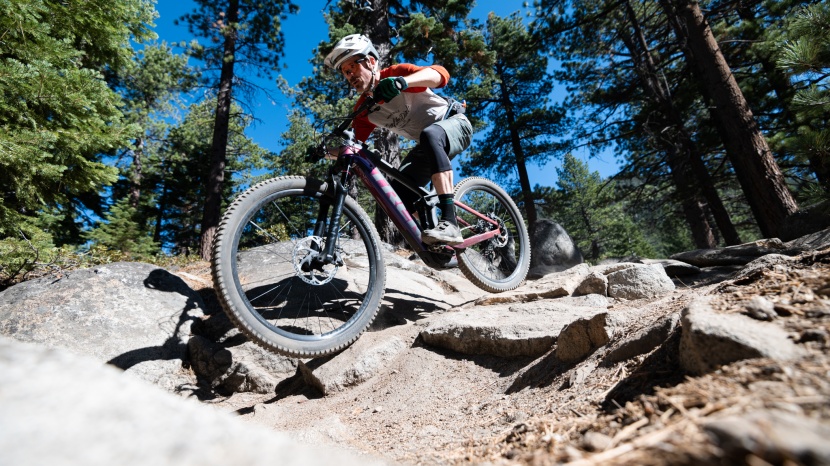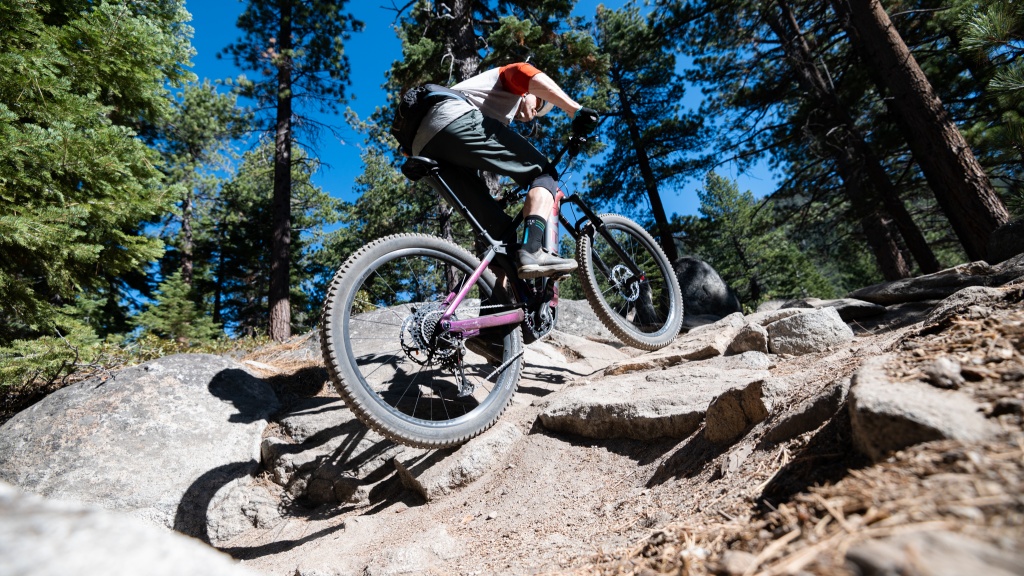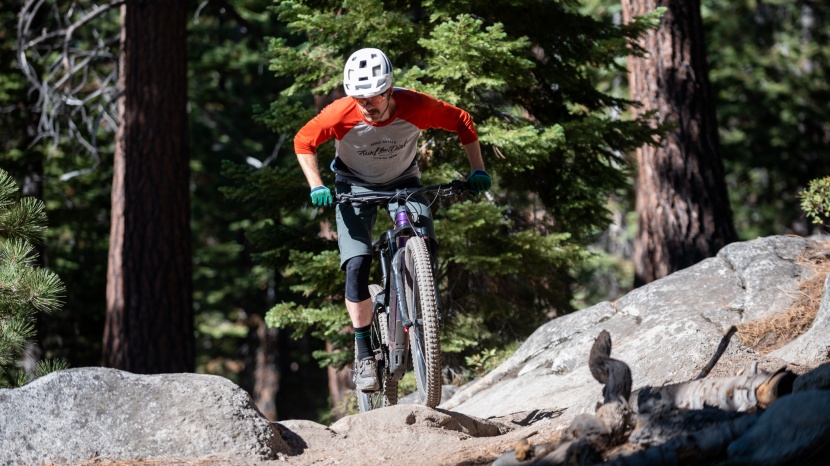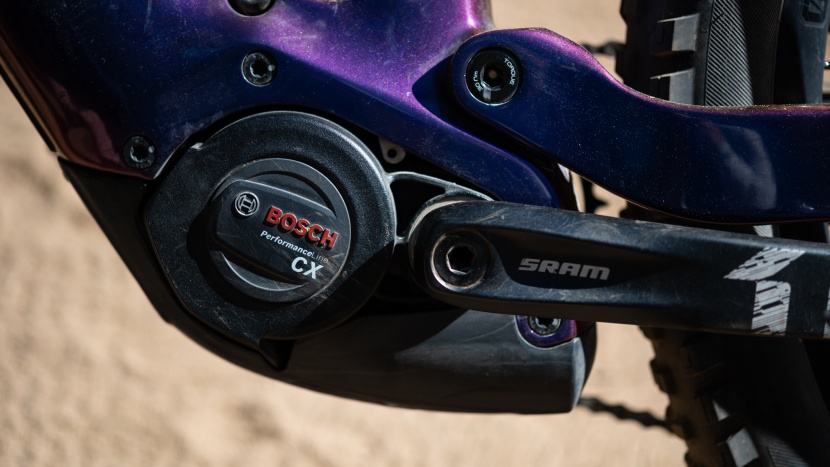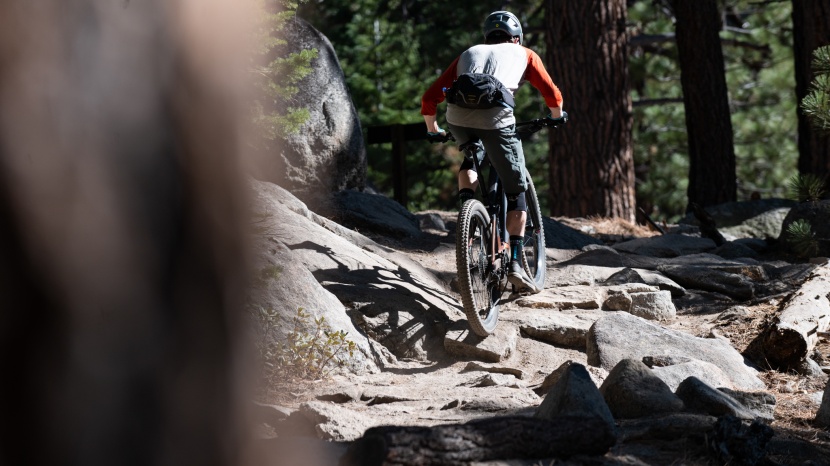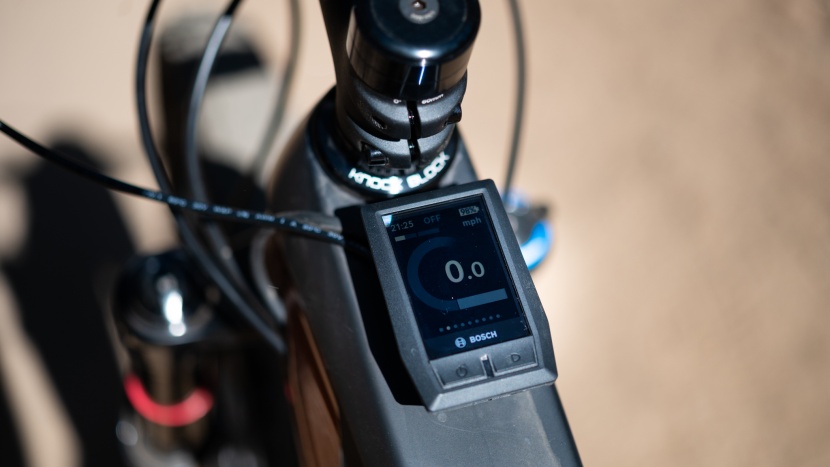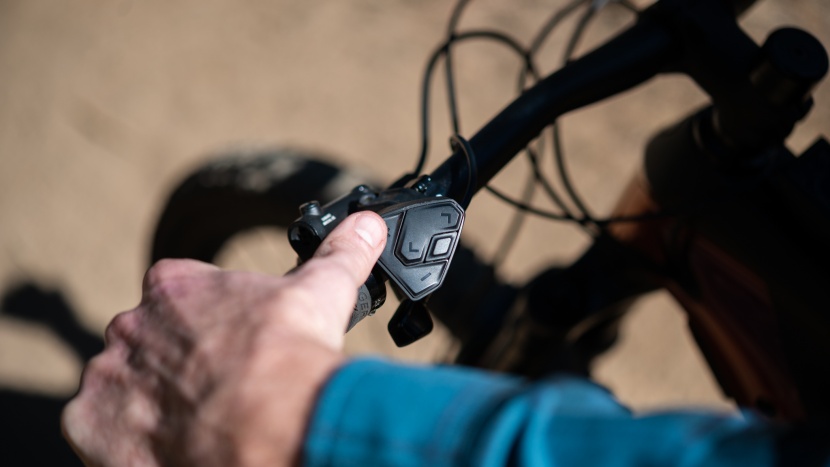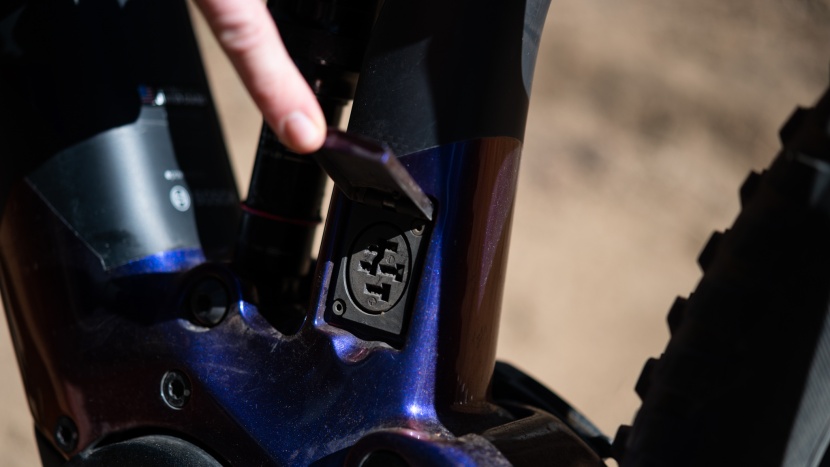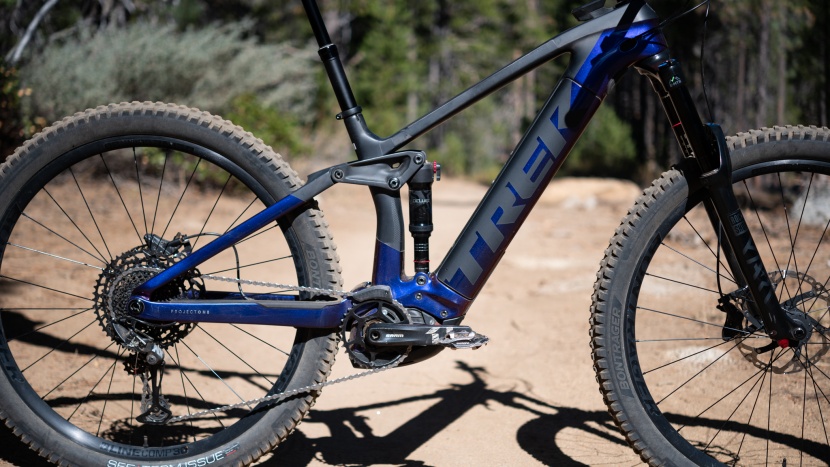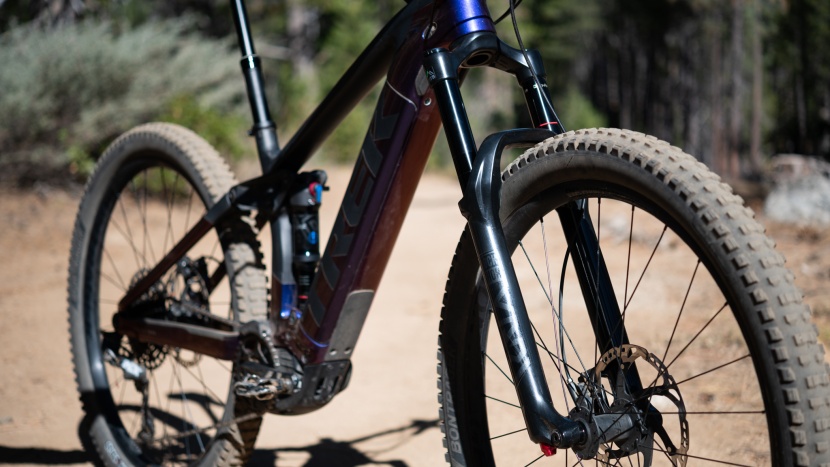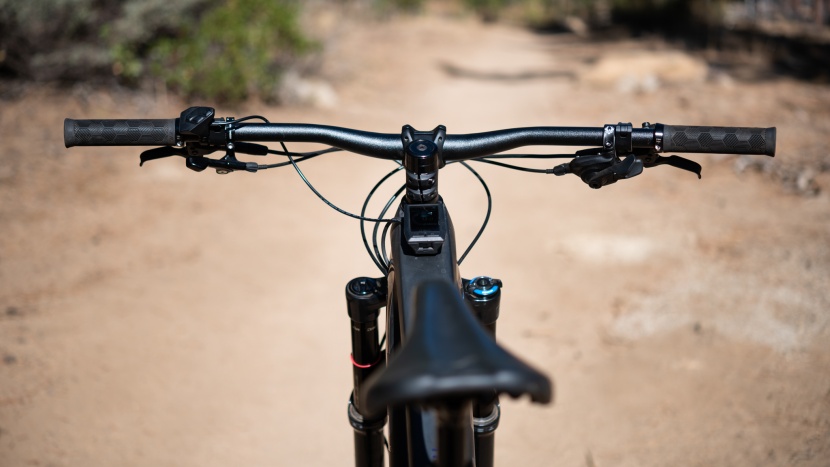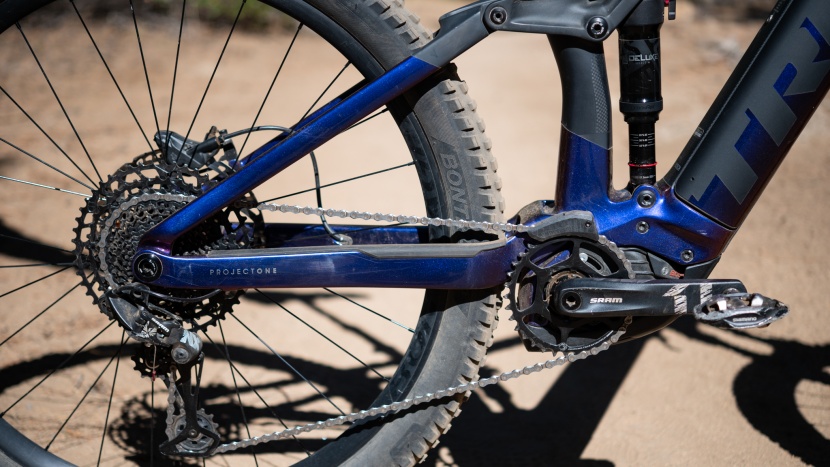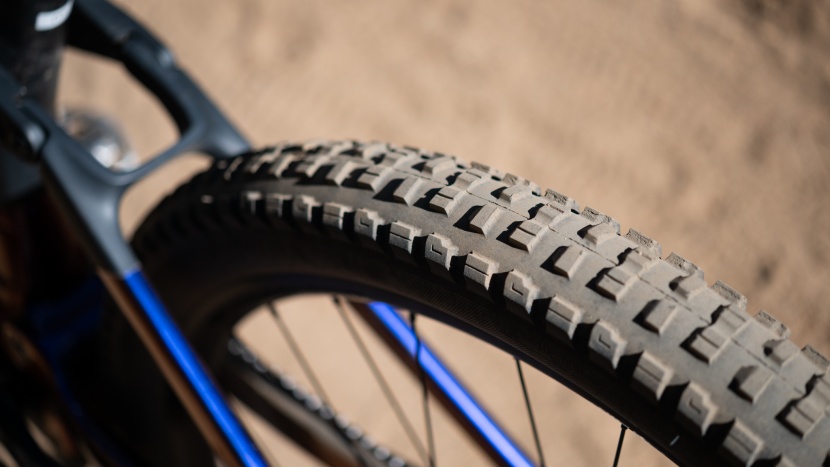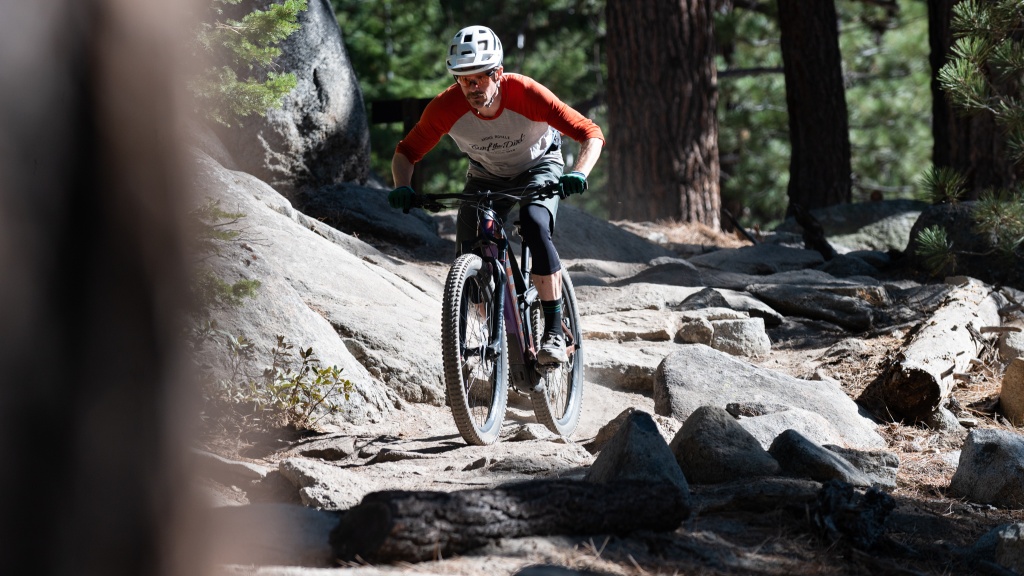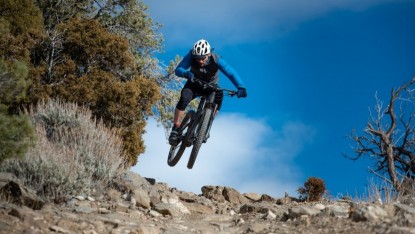Trek Rail 9.7 Review
Our Verdict
Compare to Similar Products
 This Product
Trek Rail 9.7 | |||||
|---|---|---|---|---|---|
| Awards | Best Overall E-MTB | Best for Range | Best Bang for the Buck | Best Lightweight e-mountain bike | |
| Price | $7,500 List | $7,000 List | $6,999 List | $2,899 List $2,599 at Aventon Bikes | $8,000 List |
Overall Score  |
|||||
| Star Rating | |||||
| Bottom Line | A well-rounded eMTB with modern geometry and an impressive distance range | Continued refinement keeps this well-rounded model at the top, and the highly adjustable geometry makes it more versatile than ever | A well-rounded trail riding e-MTB with a huge battery, nice build, and reasonable price | Any assessment of this bike has to follow the price tag; many people don't need or want a 5-figure e-bike, and Aventon delivers a banger | More than splitting the difference between a trail bike and a full-power e-bike, this could be the ultimate trail bike |
| Rating Categories | Trek Rail 9.7 | Specialized Turbo L... | Canyon Spectral:ON... | Aventon Ramblas | Specialized Turbo L... |
| Downhill Performance (30%) | |||||
| Climbing Performance (25%) | |||||
| Measured Effective Range (25%) | |||||
| Power Output (15%) | |||||
| E-Bike Controls (5%) | |||||
| Specifications | Trek Rail 9.7 | Specialized Turbo L... | Canyon Spectral:ON... | Aventon Ramblas | Specialized Turbo L... |
| Battery Size (Wh) | 625Wh | 700Wh | 900Wh | 708Wh | 320Wh (+160Wh Range Extender) |
| Wheel size (inches) | 29 | MX (29" front, 27.5" rear) | MX (29" front, 27.5" rear) | 29 | MX (29" front, 27.5" rear) |
| Motor System | Bosch Performance Line CX | Specialized Turbo Full Power 2.2 | Shimano EP8 | Aventon A100 | Specialized SL 1.2 (320W) |
| Motor Power (torque) | 85Nm | 90Nm | 85Nm | 100Nm | 50Nm |
| Measured Weight (w/o pedals) | 49 lbs 10 oz (Medium) | 51 lbs 3 oz (S4) | 51 lbs 15 oz (Large) | 54 lbs (Large) | 40 lbs 1 oz (S4)(2lbs 6 oz - range extender battery) |
| Measured Effective Range | 28.95 miles | 33.1 miles | 38.5 miles | 30.1 miles | 21.1 miles |
| Fork | RockShox Yari RC e-MTB, 160mm | Fox Rhythm 36, 160mm | Fox 36 Rhythm Grip, 150mm | Rock Shox 35 | Fox 36 Rhythm 160mm |
| Suspension & Travel | Active Braking Pivot, 150mm | Future Shock Rear (FSR) - 150mm | Triple Phase155mm | N/A | Future Shock Rear (FSR) - 150mm |
| Shock | RockShox Deluxe Select+ | Fox Float X Performance | Fox DPS Performance EVOL | N/A | Fox Float X Performance (FSR) 150mm |
| Frame Material | OCLV Carbon | M5 Premium Aluminum | Carbon Fiber | Aluminum | FACT 11M Carbon Fiber |
| Frame Size Tested | Medium | S4 | Large | Large | S4 |
| Available Sizes | S-XL | S1-S6 | S-XL | S-XL | S1-S6 |
| Wheelset | Bontrager Line Comp 30 | Specialized 29 Alloy | SunRingle Duroc SD37 Comp | Double Wall Ally rims, 13g spokes, 110/148 hubs | Roval Traverse 29, 30mm internal |
| Front Tire | Bontrager XR5 Team Issue 2.6" | Specialized Butcher GRID TRAIL GRIPTON T9 29" x 2.6" | Maxxis Assegai EXO 29 x 2.5 | Maxxis Rekon 29x2.4" | Specialized Butcher GRID TRAIL GRIPTON 2.3" |
| Rear Tire | Bontrager XR5 Team Issue 2.6" | Specialized Eliminator GRID TRAIL GRIPTON T7 27.5" x 2.6" | Maxxis Minion DHR II EXO+ 27.5 x 2.6 | Maxxis Rekon 29x2.4" | Specialized Eliminator GRID TRAIL 2.3" |
| Shifters | SRAM NX Eagle 12-speed | SRAM GX Eagle 12-speed | Shimano SLX 12-speed | SRAM NX Eagle | SRAM GX Eagle |
| Rear Derailleur | SRAM NX Eagle | SRAM GX Eagle | Shimano XT | SRAM NX Eagle | SRAM GX Eagle |
| Crankset | SRAM X1 1000 | Praxis M30 | Shimano STEPS | Aventon | SRAM Alloy |
| Crankarm length | 165mm | 160mm | 165mm | 165 | 170mm |
| Cassette | SRAM PG1230, 11-50T | SRAM XG1275, Eagle 10-52T | Shimano Deore M6100 10-51T | SRAM PG-1210 10-50t | SRAM XG1275 10-52T |
| Chain | SRAM NX Eagle | SRAM NX Eagle | Shimano CN-M6100 | SRAM NX Eagle | SRAM NX Eagle |
| Saddle | Bontrager Arvada 138mm | Specialized Bridge Comp | Fizik Terra Aidon X5 | Aventon Padded | Specialized Bridge Comp |
| Seatpost | Bontrager Line Dropper, 150mm | X-Fusion Manic 175mm (S4/S5) | Iridium, 175mm (size Large) | 31.6, 150mm droppers (125mm on S) | X-Fusion Manic 175mm (large) |
| Handlebar | Bontrager Comp Alloy, 780mm | Specialized Alloy 780mm | Canyon:ON HB0057 Riser | Alloy 760mm, 35mm, 9 deg rise | Specialized Trail 780mm |
| Stem | Bontrager Rhythm Comp, 60mm | Specialized Alloy Trail | Canyon:ON ST0031 | 35mm Ø, 40mm length | Specialized Trail 50mm |
| Brakes | Shimano M6120 4-piston | SRAM Code R 4-piston 220mm front and 200mm rear rotor | Shimano SLX M7120 4-piston | SRAM DB8 200mm / 180mm | SRAM Code RS 4-piston |
| Grips | Bontrager XR Trail Comp | Specialized Trail Grips | Canyon Lock-On | Lock-On | Specialized Trail |
| Measured Effective Top Tube (mm) | 611 | 630 | 637 | 642 | 631 |
| Measured Reach (mm) | 450 | 477 | 485 | 455 | 470 |
| Measured Head Tube Angle | 64.9 High /64.5 Low | Adjustable between 63.5 and 65.5-degrees in 1-degree increments | 65.5 | 66.5 | 64.6 |
| Measured Seat Tube Angle (effective) | 75 | 76.2-degrees | 76.5 | 74.5 | 75.8 |
| Measured Bottom Bracket Height (mm) | 344mm | 350mm | 36-drop | 324mm | 348mm |
| Measured Wheelbase (mm) | 1220 | 1255 | 1252 | 1230 | 1238 |
| Measured Chain Stay Length (mm) | 447 | 442 | 440 | 465 | 432 |
Our Analysis and Test Results
The Rail is a longer travel electric mountain bike made by the cycling industry giant, Trek. The 9.7 is the least expensive carbon-framed model in the line, and it comes with a budget-minded but functional build. We'd heard great things about the Rail's performance, so we purchased one to test and compare against our favorite models. We were most impressed by its distance range, and this powerful bike uses its power very efficiently. We also enjoyed its well-rounded on-trail performance, and this bike powers up the hill and is eager to rip back down it.
Downhill Performance
The Rail 9.7 performs well on the descents. This heavy bike is damp, with a ground-hugging feel that really shines on fast and flowy trails. It also handles rough and rocky sections of the trail and inspires the confidence to tackle steep descents or catch a little air.
The modern geometry of the Rail is the primary factor influencing its downhill performance. In the low geometry setting, it has a slack 64.5-degree head tube angle and a low-slung bottom bracket along with a 1220mm wheelbase and 447mm long chainstays. These numbers all translate to make it super stable and comfortable at speed with a confident front end that doesn't flinch when the pitch gets steep. In the low setting, we found it preferred to be ridden fast and that its handling could feel a bit sluggish at lower speeds and technical terrain. It doesn't feel exceptionally playful, mostly due to its weight, long chainstays, and long-ish wheelbase. When switched to the high geometry setting, the head tube angle steepens to 64.9 degrees (which is still relatively slack), and the bottom bracket rises by 5mm. We found the high setting to offer slightly more responsive handling and a more energetic feel at lower speeds and tighter sections of the trail. Having the option to adjust the geometry to your riding style or trails is a great feature that we think many riders will appreciate.
At 49 lbs and 10 oz, the Rail 9.7 weighs around the same as most full-power eMTBs. This heavy weight plays a pretty big role in how this bike handles and is one of the reasons it feels so damp and composed at speed. It settles nicely into its travel, and the ABP suspension platform feels supple and forthcoming with its travel. The suspension feels sensitive off the top and over small to mid-sized chop and chunder, and it maintains composure on bigger hits with a progressive ramp-up at the end of the stroke. However, testers did notice that over high-frequency hits, there was a rattling noise emitting from the battery or motor. We couldn't identify precisely where this noise came from, but it was a little disconcerting when skipping at speed across the top of a chunky rock garden.
The Rail 9.7 build worked well enough on the descents with notable hits and misses. The e-bike optimized RockShox Yari fork felt stiff and sturdy, although its limited tuneability left us a little bit wanting. Likewise, the RockShox Deluxe Select+ rear shock worked well enough but felt slightly under-gunned on this heavyweight bike and offered very little tunability. On the other hand, the Shimano 4-piston M6120 brakes with 203mm rotors had good stopping power and were adequate for controlling this heavy bike's speeds. The 2.6" Bontrager XR5 tires worked well in most conditions and situations, but their rounded side-to-side profile didn't offer the cornering bite that we're accustomed to from more aggressive tires. The cockpit setup was generally dialed with a wide handlebar, short stem, comfortable grips, and a 150mm dropper post.
Climbing Performance
The Rail 9.7 climbs relatively well. Its 29-inch wheels, somewhat long and slack geometry, and powerful motor give it a bit of a monster truck-ish feel, and it is best at powering up and over obstacles and holding a line. The words “finesse” and “nimble” weren't used to describe its climbing performance. Instead, testers found themselves letting the Rail's power do most of the work while enjoying the speed it could carry uphill.
Like most electric mountain bikes, the Rail 9.7 has loads of power on tap, which makes it a good climber. The motor's power helps to overcome the bike's weight to keep up your speed and maintain momentum over obstacles in the trail. Our size medium test bike weighed 49 lbs 10 oz, set up tubeless and without pedals. That weight is significant, and it is one of the reasons the Rail has a bit of a lethargic handling feel when things get tight or technical. The slack head tube angle, 64.5 degrees in the low setting, and low bottom bracket also contribute to that lethargic feeling. The bike's front end doesn't feel incredibly responsive at lower speeds or the aforementioned technical terrain. The Rail features adjustable geometry with flip chips to change the head tube angle by 0.5 degrees and adjust the bottom bracket height by 5mm. We found the highsetting to feel a bit livelier, with slightly crisper handling and fewer pedal strikes while climbing. The 75-degree effective seat tube angle is steep enough and sets the rider up in a nice seated position with a comfortable 450mm reach and a moderately long 1220mm wheelbase.
The build kit of the Rail 9.7 is nothing flashy, but it performed its duties admirably on the climbs. The 2.6" Bontrager XR5 tires stood out with a huge contact patch and a moderately aggressive tread that provided loads of traction on the uphills. The SRAM NX Eagle drivetrain provided decent shifting performance and more than enough range, considering the pedal assistance. The cockpit components were also generally fine, and the Arvada saddle proved to be quite comfortable, even on 3+ hour trail rides. Trek's ABP suspension platform is reasonably calm when seated pedaling but just active enough to keep things smooth and maintain excellent traction while climbing. and we preferred to leave the shock in the open position to enjoy all of the traction
Range
We were quite impressed with the distance range of the Rail 9.7. This bike has a 625Wh battery capacity, and it seems to use its power relatively efficiently. We found that the Rail could go the distance in both our standardized range test and on trail rides of various lengths.
We rode the Rail 9.7 in its highest output setting for 28.95 miles and 5,967 vertical feet of elevation gain during our standardized range test. This was one of the farthest of all the models we tested and not that far behind the Turbo Levo with its larger 700Wh battery. This long-range is thanks mostly to the large Bosch PowerTube 625Wh battery, but even then, it seems the Rail uses its power quite efficiently. We were able to easily exceed this range on trail rides by riding in lower output settings like Eco and Tour. It was not uncommon to exceed 30 miles of trail riding and finish with 30% or so of battery remaining.
Power Output
The Rail 9.7 is a powerful e-bike. The Bosch Performance CX motor boasts 250 watts of power and a claimed 85Nm of torque. It responds almost instantly when you press on the pedals with a nice range of support provided by the system's four output levels. Testers found it easy to get this bike up to its top speed of 20 mph, and transitions between output settings were smooth and seamless.
When you press on the pedals, the power comes on almost instantly after just a small fraction of the pedal stroke. It comes on smoothly and doesn't feel jumpy or twitchy the way some other motors can. The four modes, Eco, Tour, eMTB, and Turbo, provide 60, 140, 240, and 340% support, respectively. We found the support offered by these settings to provide a nice range for any terrain or preference. Shifts between modes felt clean, with no lag in power delivery. The motor puts out a maximum torque of 85Nm, which is quite strong, and the Rail felt like one of the most powerful bikes we've been on to date. Turbo mode is very fast and powerful, and we found ourselves riding on trails in Eco and Tour modes for the most part. When you stop pedaling, the power shuts off a moment after the pedals stop turning, and it doesn't feel too abrupt or sudden. Similarly, when you hit the 20 mph mark and the power cuts out, it doesn't feel like you've run into a wall. It's still not easy to get this bike over 20 mph, but it feels easier than some to keep your speed up.
The motor isn't particularly loud, but it emits an audible whine in all of the output settings. Compared to many earlier electric bike motors, it's an improvement, but it can't compete with the quietest models we've tested lately. The noise isn't egregious, but it isn't super stealthy, and you can definitely tell that you're riding an electric bike. The Rail pedaled surprisingly well with the motor turned off. Sure, it's heavy, but it didn't feel like as much of a boat anchor as we expected. We didn't notice any drag coming from the motor, and we could even climb moderately pitched hills without too much difficulty.
E-bike Controls
The Rail 9.7 uses the Bosch Kiox controller and top-tube mounted display. Testers were a little torn about the performance of this system. In some ways, it seemed really trick and advanced, but we felt its ergonomics and the location of the display was less than ideal. When connected to the Bosch eBike Connect app, however, you can unlock several great features like navigation, data transfers, and uploading ride info to Strava.
The Kiox display is mounted at the front of the top tube, just behind the stem and headset. The display itself is a neat little unit that looks a lot like a Garmin GPS. At the bottom of the unit is a power button that turns the system on and off. It has a relatively large color screen that shows a wealth of information with multiple pages that you can scroll through. The main page is the most useful, as it shows your output setting, current speed, and remaining battery charge. The output setting is shown in small text at the top of the screen and a color-coded graphic that shows how much power you are using at any given time. The battery charge indicator is at the upper right corner of the screen, and it shows the remaining battery life numerically as a percentage. In the center of the screen in large numbers is your current speed. Several other pages show a huge variety of metrics for those who wish to nerd out on their ride statistics. While we liked the screen and its display information, we found the location was somewhat difficult to see while riding. Looking down at the screen meant we were taking our eyes off the trail, which was less than ideal.
The Kiox controls are situated next to the left grip in a relatively easy-to-reach location. The control unit has + and - buttons on the left side to shift up or down through the output settings. It also has left and right arrows to scroll through the various pages on the display. There is also a select button on the control unit, which is used to adjust settings and scroll through menus on the display. There is also a walk mode button on the top of the unit, which you press before holding the + button to propel the bike forward at 3 mph. While the control unit is situated in a relatively easy place to reach with your thumb, testers found the ergonomics to be less than perfect. It wasn't the easiest to locate the right button, and it often required looking down to make sure your thumb was in the right spot.
The charging port is located on the left side of the seat tube just above the motor. It has a color-matched plastic cover, and it blends into the frame quite stealthily. The plug is easy to orient, and it has a relatively secure feeling connection. Charging time seems relatively standard for an electric bike, and the display shows the current charge level if you turn it on to check it while it is in progress.
Build
The Rail 9.7 sports a somewhat budget-minded build that helps keep the price of this bike out of the stratosphere. While it is far from the top of the line, everything is serviceable and completely functional. Everything is attached to an OCLV carbon frame with a Bosch Performance Line CX 250W motor and an integrated, removable Bosch PowerTube 625Wh battery.
Trek has chosen a RockShox suspension package to handle the 150/160mm of rear/front travel. The fork is an e-bike-optimized RockShox Yari RC with a 42mm offset. This fork has a stiff chassis and burly crown that is up to the task of handling the weight and forces of this heavy brawler. A RockShox Deluxe Select+ handles the rear suspension duties. While functional, the fork and shock are relatively basic, with limited tune-ability compared to fancier options.
The cockpit setup of the Rail 9.7 is modern and ready for the aggressive shredding this bike was made for. The Bontrager Comp alloy handlebar is 780mm wide with a 15mm rise and comfortable Bontrager XR Trail Comp lock-on grips. The handlebar is clamped to a 60mm Bontrager Rhythm Comp stem with a knock block integrated into the headset. At the back of the bike, a relatively comfortable 138mm wide Bontrager Arvada saddle sits atop a 150mm travel Bontrager Line dropper seatpost.
Shifting duties have been left to a SRAM NX Eagle 12-speed drivetrain. The 11-50 tooth cassette is paired with a 36-tooth chainring attached to 165mm cranks. Slowing and stopping this heavyweight bike has been tasked to a set of Shimano M6120 4-piston hydraulic disc brakes with 203mm rotors front and rear. While not particularly fancy, these brakes, especially the big rotors, do an excellent job controlling the speeds this bike can travel.
The Rail 9.7 rolls on a set of 29-inch Bontrager Line Comp 30 alloy wheels with a 30mm inner rim width. A pair of 2.6-inch wide Bontrager XR5 Team Issue tires are mounted to those rims and are tubeless-ready. The XR5 tires have a moderately aggressive and highly versatile tread and are ready for just about anything.
Should You Buy the Rail 9.7?
The Rail 9.7 is a fun, well-rounded electric mountain bike that has a lot going for it. This longer travel 29er has a powerful Bosch motor and a 625Wh battery capacity that gives it an impressive distance range. Its power output is strong, with 4 output levels to suit your needs and terrain. It rallies uphill with ease and prefers a powerful point-and-shoot approach. It's also a confident and planted descender with all the modern geometry touches and flip-chip adjustable geometry to match your preferences. We found its display and controls to be a bit quirky, and there was a disconcerting rattle coming from the battery or motor while riding over the chatter. That said, the Rail was a blast to ride, and we feel it's a sleek-looking and versatile ride that is worthy of consideration.
With the rail, you get a nice carbon frame with modern geometry and solid all-around performance. However, it is outfitted with a bunch of budget-oriented components that don't do this bike any favors or enhance its performance. If you have a little wiggle room in your budget, we'd suggest checking out the next model up in their line that comes with more tuneable suspension. Otherwise, the Rail 7 has an aluminum frame and almost identical specs to the model we tested but costs significantly less.
What Other Electric Mountain Bike Should You Consider?
Looking for something a bit more versatile? The Specialized Turbo Levo Comp Alloy is our highest-rated model with a powerful motor, impressive range, and killer all-around performance, plus it has an incredibly adjustable geometry that lets you set it up however you want. If you're looking for the biggest range, then Canyon Spectral:ON CF 8 and its 900Wh battery should be on your shortlist. Not only does this bike cost less, but it comes with a nicer build, has a well-rounded performance, and the longest range of all the models we tested. If your budget is tighter, we prefer the Commencal Meta Power TR Ride, which will save you a couple of thousand dollars and offers a similar overall performance to the Rail with similar downhill performance and better e-bike controls.


